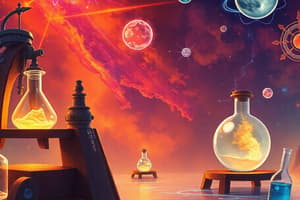Podcast
Questions and Answers
ਵਿਗਿਆਨੀ ਮਨਰੰਜਨ ਵਿੱਚ ਕਿਸੇ ਤੱਤ ਦੀ ਜਾਂਚ ਕਰਨ ਲਈ ਕਿਹੜਾ ਤਰੀਕਾ ਵਰਤਿਆ ਜਾਂਦਾ ਹੈ?
ਵਿਗਿਆਨੀ ਮਨਰੰਜਨ ਵਿੱਚ ਕਿਸੇ ਤੱਤ ਦੀ ਜਾਂਚ ਕਰਨ ਲਈ ਕਿਹੜਾ ਤਰੀਕਾ ਵਰਤਿਆ ਜਾਂਦਾ ਹੈ?
- ਸੰਵੇਦਨਾ ਮੰਨਣਾ
- ਲੋਕਤੰਤਰ ਜਾਣਕਾਰੀ ਨੂੰ ਨੱਕਾਰਨਾ
- ਵਿਗਿਆਨਕ ਵਿਧੀ (correct)
- ਆਪਣੇ ਆਪ ਨੂੰ ਦਿਖਾਉਣਾ
ਵਿਗਿਆਨ ਵਿੱਚ ਡੇਟਾ ਦੇ ਵਿਸ਼ਲੇਸ਼ਣ ਦਾ ਕੀ ਉਦੇਸ਼ ਹੈ?
ਵਿਗਿਆਨ ਵਿੱਚ ਡੇਟਾ ਦੇ ਵਿਸ਼ਲੇਸ਼ਣ ਦਾ ਕੀ ਉਦੇਸ਼ ਹੈ?
- ਨਵੇਂ ਸੰਦ ਬਣਾਉਣਾ
- ਹਿਪੋਥੇਸਿਸ ਦਾ ਸਹਾਰਾ ਜਾਂ ਇਨਕਾਰ ਕਰਨਾ (correct)
- ਵਿਗਿਆਨੀ ਸੰਚਾਰ ਵਿੱਚ ਰੁਚੀ ਲੈਣਾ
- ਜਵਾਬ ਦੇਣ ਲਈ ਖੰਡਨ ਪ੍ਰਾਪਤ ਕਰਨਾ
ਕਿਹੜਾ ਸੰਦ ਵਿਗਿਆਨਿਕ ਖੋਜ ਲਈ ਵਰਤਿਆ ਜਾਂਦਾ ਹੈ?
ਕਿਹੜਾ ਸੰਦ ਵਿਗਿਆਨਿਕ ਖੋਜ ਲਈ ਵਰਤਿਆ ਜਾਂਦਾ ਹੈ?
- ਪੈਂਸਿਲ
- ਟੈਲੀਫੋਨ
- ਮਾਈਕਰੋਸਕੋਪ (correct)
- ਲੈਪਟਾਪ
ਵਿਗਿਆਨਕ ਸੰਚਾਰ ਦਾ ਕੀ ਅਰਥ ਹੈ?
ਵਿਗਿਆਨਕ ਸੰਚਾਰ ਦਾ ਕੀ ਅਰਥ ਹੈ?
ਸਮਾਗਮਾਂ ਵਿੱਚ ਵਿਗਿਆਨਕ ਜਾਣਕਾਰੀ ਸਾਂਝਾ ਕਰਨ ਦਾ ਇਕ ਨਿਰਧਾਰਤ ਮਾਰਗ ਕਿਹੜਾ ਹੈ?
ਸਮਾਗਮਾਂ ਵਿੱਚ ਵਿਗਿਆਨਕ ਜਾਣਕਾਰੀ ਸਾਂਝਾ ਕਰਨ ਦਾ ਇਕ ਨਿਰਧਾਰਤ ਮਾਰਗ ਕਿਹੜਾ ਹੈ?
ਵਿਗਿਆਨਿਕ ਪ੍ਰਵਿਧੀ ਦੇ ਮੁੱਖ ਪਦਾਰਥ ਕਿਹੜੇ ਹਨ?
ਵਿਗਿਆਨਿਕ ਪ੍ਰਵਿਧੀ ਦੇ ਮੁੱਖ ਪਦਾਰਥ ਕਿਹੜੇ ਹਨ?
ਵਿਗਿਆਨ ਦਾ ਜੋੜ ਕਿਵੇਂ ਹੁੰਦਾ ਹੈ?
ਵਿਗਿਆਨ ਦਾ ਜੋੜ ਕਿਵੇਂ ਹੁੰਦਾ ਹੈ?
ਜੀਵ ਵਿਗਿਆਨ ਵਿੱਚ ਕਿਹੜਾ ਵਿਸ਼ਾ ਸ਼ਾਮਲ ਨਹੀਂ ਹੈ?
ਜੀਵ ਵਿਗਿਆਨ ਵਿੱਚ ਕਿਹੜਾ ਵਿਸ਼ਾ ਸ਼ਾਮਲ ਨਹੀਂ ਹੈ?
ਵਿਗਿਆਨਿਕ ਕਾਨੂੰਨ ਕਿਹੜੀ ਚੀਜ਼ ਵਿੱਚ ਬਿਆਨ ਕੀਤਾ ਜਾਂਦਾ ਹੈ?
ਵਿਗਿਆਨਿਕ ਕਾਨੂੰਨ ਕਿਹੜੀ ਚੀਜ਼ ਵਿੱਚ ਬਿਆਨ ਕੀਤਾ ਜਾਂਦਾ ਹੈ?
ਵਿਗਿਆਨਿਕ ਥਿਊਰੀ ਵਿੱਚ ਕਿਹੜੀ ਗੱਲ ਬੁਲੰਦ ਹੈ?
ਵਿਗਿਆਨਿਕ ਥਿਊਰੀ ਵਿੱਚ ਕਿਹੜੀ ਗੱਲ ਬੁਲੰਦ ਹੈ?
ਭౌਤਿਕ ਵਿਗਿਆਨ ਦੇ ਅਧੀਨ ਕਿਹੜਾ ਵਿਸ਼ਾ ਆਉਂਦਾ ਹੈ?
ਭౌਤਿਕ ਵਿਗਿਆਨ ਦੇ ਅਧੀਨ ਕਿਹੜਾ ਵਿਸ਼ਾ ਆਉਂਦਾ ਹੈ?
ਕਿਹੜਾ ਬਿਆਨ ਗਲਤ ਹੈ?
ਕਿਹੜਾ ਬਿਆਨ ਗਲਤ ਹੈ?
Flashcards
ਵਿਗਿਆਨਕ ਜਾਂਚ
ਵਿਗਿਆਨਕ ਜਾਂਚ
ਇੱਕ ਪ੍ਰਕਿਰਿਆ ਜੋ ਵਿਗਿਆਨਕ ਤਰੀਕੇ ਨਾਲ ਕੁਦਰਤੀ ਦੁਨੀਆ ਬਾਰੇ ਸਵਾਲਾਂ ਦੀ ਜਾਂਚ ਕਰਨ ਲਈ ਵਰਤੀ ਜਾਂਦੀ ਹੈ। ਇਸ ਵਿੱਚ ਸਿਖਲਾਈ ਦਿੱਤੀ ਗਈ ਸੋਚ, ਸ਼ੰਕਾਵਾਦ ਅਤੇ ਖੁੱਲੇ ਦਿਮਾਗ ਵਾਲੇ ਵਿਚਾਰ-ਮੰਥਨ ਸ਼ਾਮਲ ਹਨ।
ਵਿਗਿਆਨਕ ਸਾਧਨ ਅਤੇ ਉਪਕਰਨ
ਵਿਗਿਆਨਕ ਸਾਧਨ ਅਤੇ ਉਪਕਰਨ
ਵਿਸ਼ੇਸ਼ ਸਾਧਨਾਂ ਦੀ ਵਰਤੋਂ ਕਰਕੇ ਨਿਰੀਖਣ ਅਤੇ ਮਾਪ ਕਰਨਾ ਜਿਵੇਂ ਕਿ ਮਾਈਕ੍ਰੋਸਕੋਪ, ਟੈਲੀਸਕੋਪ, ਸਪੈਕਟ੍ਰੋਮੀਟਰ ਅਤੇ ਪ੍ਰਯੋਗਸ਼ਾਲਾ ਸਾਮਾਨ।
ਵਿਗਿਆਨਕ ਸੰਚਾਰ
ਵਿਗਿਆਨਕ ਸੰਚਾਰ
ਬਹੁਤ ਸਾਰੇ ਵਿਗਿਆਨੀਆਂ ਦੁਆਰਾ ਇੱਕ ਸਮੂਹ (peer-reviewed) ਜਰਨਲਾਂ, ਸੰਮੇਲਨਾਂ ਵਿੱਚ ਪੇਸ਼ਕਾਰੀਆਂ ਅਤੇ ਔਨਲਾਈਨ ਸਰੋਤਾਂ ਵਿੱਚ ਪ੍ਰਕਾਸ਼ਿਤ ਹੋਣ ਦੁਆਰਾ ਵਿਗਿਆਨਕ ਖੋਜਾਂ ਅਤੇ ਵਿਚਾਰਾਂ ਨੂੰ ਸਾਂਝਾ ਕਰਨਾ।
ਡਾਟਾ ਇਕੱਠਾ ਕਰਨਾ
ਡਾਟਾ ਇਕੱਠਾ ਕਰਨਾ
Signup and view all the flashcards
ਡਾਟਾ ਵਿਸ਼ਲੇਸ਼ਣ
ਡਾਟਾ ਵਿਸ਼ਲੇਸ਼ਣ
Signup and view all the flashcards
ਵਿਗਿਆਨਕ ਵਿਧੀ
ਵਿਗਿਆਨਕ ਵਿਧੀ
Signup and view all the flashcards
ਪਰਿਕਲਪਨਾ ਕੀ ਹੈ?
ਪਰਿਕਲਪਨਾ ਕੀ ਹੈ?
Signup and view all the flashcards
ਇੱਕ ਪ੍ਰਯੋਗ ਕੀ ਹੈ?
ਇੱਕ ਪ੍ਰਯੋਗ ਕੀ ਹੈ?
Signup and view all the flashcards
ਵਿਗਿਆਨ ਦੀਆਂ ਸ਼ਾਖਾਵਾਂ
ਵਿਗਿਆਨ ਦੀਆਂ ਸ਼ਾਖਾਵਾਂ
Signup and view all the flashcards
ਵਿਗਿਆਨਕ ਕਾਨੂੰਨ
ਵਿਗਿਆਨਕ ਕਾਨੂੰਨ
Signup and view all the flashcards
ਵਿਗਿਆਨਕ ਸਿਧਾਂਤ
ਵਿਗਿਆਨਕ ਸਿਧਾਂਤ
Signup and view all the flashcards
ਵਿਗਿਆਨਕ ਵਿਧੀ ਕਿਵੇਂ ਕੰਮ ਕਰਦੀ ਹੈ?
ਵਿਗਿਆਨਕ ਵਿਧੀ ਕਿਵੇਂ ਕੰਮ ਕਰਦੀ ਹੈ?
Signup and view all the flashcards
ਵਿਗਿਆਨਕ ਵਿਧੀ ਵਿੱਚ ਕੀ ਸ਼ਾਮਲ ਹੈ?
ਵਿਗਿਆਨਕ ਵਿਧੀ ਵਿੱਚ ਕੀ ਸ਼ਾਮਲ ਹੈ?
Signup and view all the flashcards
Study Notes
Scientific Method
- Science is a systematic approach to understanding the natural world
- It involves observation, experimentation, and the formulation of testable hypotheses
- The scientific method is a cyclical process, not a linear one. It often involves returning to previous stages as new data is collected
- Key components of the scientific method include:
- Observation: noticing a phenomenon
- Question: formulating a question about the observation
- Hypothesis: proposing a testable explanation for the question
- Prediction: stating what is expected to happen if the hypothesis is correct
- Experiment: designing and conducting a test to evaluate the prediction
- Analysis: evaluating the results of the experiment
- Conclusion: determining if the results support or refute the hypothesis
- The scientific method relies on critical thinking, skepticism, and reproducibility of results
Branches of Science
- Science is broadly categorized into several branches, including:
- Physical Sciences: Study matter and energy. Includes:
- Physics: Study of matter, energy, and their interactions
- Chemistry: Study of matter and its properties, composition, and reactions
- Astronomy: Study of celestial objects and phenomena in the universe
- Life Sciences: Study living organisms and their interactions. Includes:
- Biology: Study of living organisms and their processes
- Botany: Study of plants
- Zoology: Study of animals
- Genetics: Study of genes and heredity
- Earth Sciences: Study the Earth and its processes. Includes:
- Geology: Study of the Earth's structure, composition, and processes
- Meteorology: Study of the atmosphere and weather patterns
- Oceanography: Study of oceans and marine life
- Physical Sciences: Study matter and energy. Includes:
Scientific Laws and Theories
- A scientific law describes a fundamental relationship or pattern in nature. It is often expressed as a mathematical equation or statement about how things work.
- A scientific theory is a well-substantiated explanation of some aspect of the natural world. Theories are based on a large body of evidence and are supported by numerous and varied observations. Theories are not merely guesses, they have withstood rigorous testing and are the best explanation available based on current knowledge.
Scientific Inquiry
- Scientific inquiry involves using the scientific method to investigate questions about the natural world.
- It emphasizes critical thinking, skepticism, and open-mindedness.
- Scientists use different types of experiments and observations to gather data.
- Data analysis allows scientists to determine if their findings support or refute their hypotheses.
Scientific Tools and Equipment
- Various tools are used in scientific research to make observations and measurements.
- These tools include microscopes, telescopes, spectrometers, and various lab equipment.
- Sophisticated tools and technology constantly advance scientific capability.
Scientific Communication
- It is important for scientists to share their findings and ideas.
- This usually occurs through publications in peer-reviewed journals, presentations at conferences, and online resources.
- Scientific communication allows for the verification and advancement of scientific knowledge.
Studying That Suits You
Use AI to generate personalized quizzes and flashcards to suit your learning preferences.




